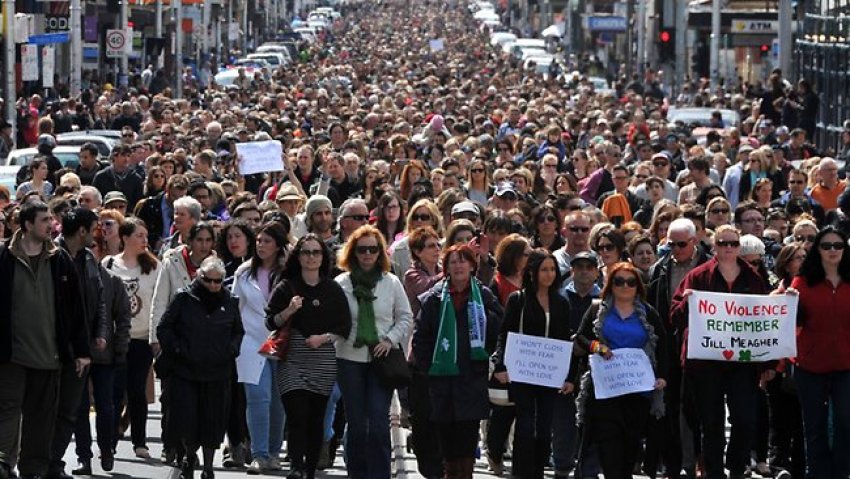
PM Julia Gillard's sharp serve against opposition leader Tony Abbott’s sexism gave many, especially women, long overdue cause to fist-pump the air and think, “Finally, a point for us.”
She threw a verbal hand grenade on top of the simmering indignation that had pent up due to radio broadcaster Alan Jones’ relentless misogyny and the aftermath of the brutal rape and murder of ABC journalist Jill Meagher. The speech rapidly went viral, hit global news and connected with thousands of women fed up with being told to shut up and accept the double standards.
But those on the ball quickly stopped rejoicing, remembering the war Gillard has waged on women in government, not least the vicious welfare cuts she handed down to sole parents on the same day she lambasted Abbott.
Putting sole parents of children aged over eight years, parents who are mostly women, on the tiny Newstart allowance is a deliberate government strategy to attack extremely vulnerable people for the sake of a budget surplus.
The government plans to save $700 million from the cuts, in effect sacrificing some of Australia's poorest people to appease big business. Telling women to get a job or suffer through the poverty is humiliating, punishing and, undoubtedly, misogynist.
Gillard's willingness to defend the atrocious woman-hating antics of former parliamentary speaker Peter Slipper was also an irony lost on few.
Yet arguably, this is the first time Labor has taken on the Liberals about any issue of substance since Gillard first became prime minister. The significance that it was sexism and misogyny, which she has previously staunchly ignored, should not be underestimated.
Poll analysts and Labor spin-doctors guessed that speaking out about sexism would provoke a reaction. They obviously hoped it would provide some political cover for Labor's unpopular social and economic policies, which are nearly indistinguishable from the Coalition's.
Right-wing politicians and media commentators have tried to play down the impact of Gillard's speech, saying it amounted to mere rhetorical theatrics, sledging, political correctness or a misuse of the word “misogynist”.
Abbott does have a demonstrable record of holding contempt for women, undermining equality, attacking reproductive rights and even appealing to “ironing housewives”. This is why Gillard's sure-to-be-classic barb — that Abbott was “now looking at his watch because, apparently, a woman has spoken for too long” — hit its mark so well.
Abbott’s policies and rhetoric legitimise and embolden hateful speech, sexist language and the abuse of women, including sexism directed against the prime minister herself.
But Labor's policies are hardly better. Gillard, who took power by double-dealing with the faceless men of the Labor party, has attacked the majority of Australian women with punitive economic policies, pro-business industrial relations laws and social conservatism, while promoting the interests of the super-rich.
The reason Gillard's speech struck such a resonant chord throughout the Australian and international public is not because she or her government are champions of any kind of feminist cause.
It's because widespread sexism and misogyny, from Jones's “women are destroying the joint” comments to everyday workplace sexual harassment, is still commonplace at the same time as women are increasingly expected to embody a more 1950s-style temperament — and they're beyond sick of it.
A willingness to fight back has been brewing. Since one misguided Toronto cop unwittingly triggered a surge of anger against rape “victim blaming” and SlutWalks took to the streets of cities around the world last year in response, the horrific oppression women suffer and endure has been pushed to the forefront of social struggle once again.
And then Meagher's shocking murder on September 22 caused thousands of women in Australia to call bullshit on being told they cannot walk alone at night, or dress a certain way, or drink, or breathe without expecting to be raped or attacked. Outrageously, police and most initial media commentary urged women to “be more careful” instead of condemning the violent predator.
As a result, the long-standing tradition of “Reclaim the Night” marches to protest violence against women have a new energy. This is particularly true after 30,000 people marched in Melbourne’s Sydney Rd — where Meagher disappeared — to call for an end to violence against women on September 30.
These are the sparks fanned by Gillard's speech.
But Gillard's welfare reforms, coupled with harsh austerity and public service cuts being carried out by state governments, are driving more women into poverty. Jeff Sparrow said on Overland on October 15 that “almost any grassroots fight against sexism in Australia would very quickly come into conflict with the policies of this government”.
Overland's Stephanie Convery said of Gillard’s “parliamentary smackdown” on October 10 that it revealed the need to push for more than words and symbolism: “Standing up for women’s rights is not just about calling sexism for what it is. It’s about agitating for specific change. It’s about making concrete demands of society and of the government.”
Ordinary women, united with supportive men, hold the power to demand such change if they organise and mobilise. The goal must be to raise women out of poverty and strengthen their political voice, to make it too dangerous for the government to not hear their calls, to punish the rapists and not the victims, and to defeat those sexists and misogynists who think women deserve less than full equality.
Comments
Anonymous replied on Permalink